Written by: Aiza Azam
Posted on: August 21, 2013 |  | 中文
| 中文
Senator Mushahid Hussain Sayed is the Chairman of the Pakistan-China Institute, an Islamabad based organization that works on promoting people-to-people relations between Pakistan and China. He granted an exclusive interview to Youlin Magazine.
How did the concept of a Pakistan-China Institute emerge? Why was the need for it felt, and what was the vision that drove its objectives?
Let me provide you a brief context. My personal relationship with China has been a long-standing one. I first went there in 1970 as a young teenager, when I was still a student in FC College. Since that time, over a period of 42 years, I have made over forty visits to China. Since the onset of the 21st century, particularly from 2004 / 2005 onwards, I felt that there was the need for a dedicated institution, devoted to promoting Pakistan-China relations at the people-to-people level in different areas like diplomacy, defense, education, energy, economy and culture; an institution that would focus on those segments of society which are not as active in this otherwise robust state to state interaction. These included the youth in general (students in particular), women, young entrepreneurs and others who are interested in learning more about China, as well as learning the Chinese language.
I first raised the possibility of forming a special China institute, which would be taking practical measures and influencing policies, rather than focusing on academic research only, in April 2006. It was when I led a goodwill delegation to China and broached the idea to some Chinese friends, one of whom was Mr Ai Ping, who was then the Director General of the South Asia Department in the CPCC’s International Department. I also discussed it with some Chinese think tanks which showed a great deal of interest. The idea took another three years to mature into reality, and, in 2009, I decided to launch the Pakistan-China Institute. It was formally inaugurated on October 1st that year, in a function held at the Islamic International University. Choosing that particular university was an apt decision, because it has the largest Chinese student population of any Pakistani educational institution. The then Chinese ambassador, Mr Luo Zhaohui, was the chief guest on the occasion.
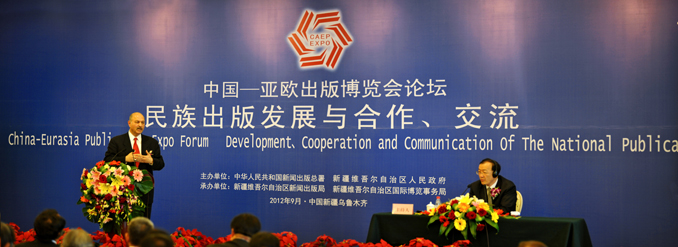 |
| Senator Mushahid speaking at 2012 the China-Eurasia Publications Expo Forum in Urumqi |
You have had a close association with China and the Chinese people, one that is almost four decades long. Is this Institute the realization of a long held ideal or is it a step towards achieving a broader objective?
Speaking as a Pakistani, a citizen looking at the future of his country, I believe it is imperative that we look at things within a broader strategic level, in the context of where we are located, with a rising China at the helm of an Asian century in which the balance of economic and political power is shifting from the West to the East. I feel that Pakistan’s political stability, economic strength, and the prosperity of its people is inextricably intertwined with our relationship with China, given that it is our closest friend and also our most reliable partner. In fact, I would also say that in terms of domestic Pakistani politics, China constitutes a factor today for national unity and cohesion. Because if there are three issues on which all Pakistanis agree, I would list them as the nuclear program, the Kashmir question, and our bond of friendship with China, all of which are above any controversy; this is a stance that cuts across party lines as well.
The track record of Pakistan-China relations bears testimony to what I have stated, because on all the occasions we have needed China’s support, it has always been forthcoming in an unreserved and unconditional manner. Moreover, China has never interfered in our internal affairs, and it has never sought to provide any assistance to Pakistan with any strings attached.
What ventures did PCI begin with, and what are some of its key projects?
We started off with a number of seminars, in which we invited distinguished guests from Pakistan, as well as visitors from China and other countries, including some from the U.S., all of whom shared a keen interest in Pak-China relations and in the region as a whole. Soon after our launch, we were honored to receive His Excellency Li Zhaoxing, the former foreign minister of China and Chairman of the Foreign Relations Committee of the National People’s Congress. And he accepted to become the honorary Chairman of the Pakistan-China Institute.
We also hosted various delegations from China, including such distinguished participants as Professor Wang Jisi, the dean of International Studies at Peking University; Mr Ai Ping, Vice Minister of the International Department of the Communist Party of China; Mr Shu Zhensui, the Secretary General of the China Foundation for Peace and Development; Professor Tang Menshen, Director of the Pakistan Study Center at Peking University; and Mr Li Xiguang, Head of the Pakistan Center at Jinhua University.
We launched our own website as well, nihao-salam.com, which also features a daily newsletter that quickly grew to be very popular.
In September 2010, I led a delegation of the Pakistan-China Institute to Urumqi to attend the Eurasia Expo. Our visit there had a second purpose as well: to find teachers for our recent initiative to start teaching the Chinese language to students at the Roots School System, a leading private institution which is now partnered with the Pakistan-China Institute. Thanks to the cooperation between PCI and the RSS, we now have over 3000 students studying Chinese at the school level in Islamabad alone.
Then, we also launched two initiatives in film-making, which yielded two finished projects. One is a forty-minute documentary called Rising China, which we filmed on location in China, and for which we visited Beijing, Urumqi and the 2010 Shanghai Expo. The second one was also a documentary, produced by the energetic head of the Cultural Wing of PCI, Miss Saadia Haseeb, in 2012. It is a thirteen part documentary Called Journey of Friendship, and its focus is on portraying the life of the average Chinese citizen for Pakistani audiences.
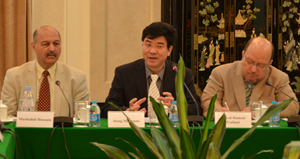 |
| Senator Mushahid as co-host of the first Trilateral Dialogue (China-Pakistan-Afghanistan) held in Beijing, August 2013 |
In July 2011, the Pakistan-China Institute had signed an MoU with the Xinjiang Association for Cultural Relations with Foreign Countries, and in February 2012, we received a high level delegation from this organization in Islamabad. During this visit, we launched another PCI website, pakistan-china.com. The key event of this occasion was the launch of the first Pakistan-China joint venture in magazine publishing in the form of a monthly periodical, Youlin (Good Neighbours). And in July 2012, PCI launched the magazine’s website, youlinmagazine.com, the first website in Pakistan which is in both Chinese and English, and which is fast becoming the principle platform to promote the culture of the two countries and facilitate social and informational exchanges.
In 2012, PCI also signed an MoU with the China Foundation for Peace and Development, which includes, among other areas of cooperation, a book project. I am compiling the book as Editor, and it features several distinguished writers. With their contributions, this book will, Inshallah, become an essential and authoritative background book on the history of Pakistan-China relations, and we hope that we can launch it to coincide with the 60th anniversary of the historic March 1963 Boundary Agreement that was concluded between Pakistan and China.
PCI is also in discussions with prominent Chinese think tanks such as the China Foundation for International Studies, a delegation from which we hosted in Lahore a few months ago, and which was led by its president Mr Zhang Deguang, former Secretary General of the Shanghai Cooperation Organization; and the China Association for International Friendly Contact, a delegation from which we received at PCI this same year.
In early September, I led a delegation of the PCI, which included the Editor of the Youlin magazine and website, Dr Dushka H. Saiyid, the Managing Director of Oxford University Press in Karachi Mrs Ameena Saiyid, and the Associate Editor of the Youlin magazine and website, Aiza Azam, to attend the first Eurasia Publications Expo. I, along with our Chinese hosts, was nominated as one of the keynote speakers for the event. And it was also the occasion on which we published five books jointly with our counterparts in Urumqi.
PCI has been established for a very short time; how do you measure its success in terms of its stated objective of encouraging people-to-people contact between the two nations?
With regards to what PCI has achieved, I would say we have a very philosophical long term approach, shall we say one that mirrors the successful Chinese approach to all important affairs. There is a Chinese saying that ‘the journey of a thousand miles begins with a single step.’ And in three years, while our achievements may be modest, whatever we have done has been solid, substantive, and sustainable work that will have a long term impact.
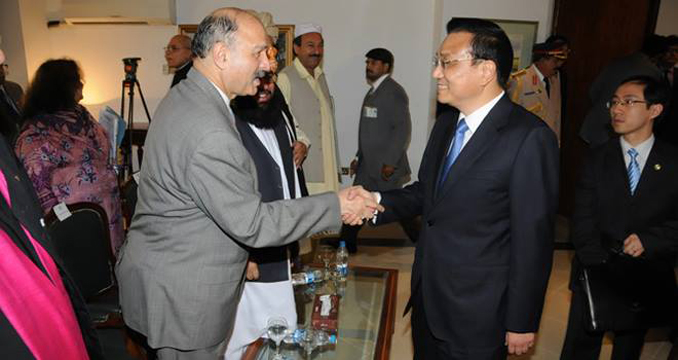 |
| Senator Mushahid Hussain meeting Chinese Premier Li Keqiang |
The PCI has emerged today as the premier people-to-people platform that is non-governmental, that is non-political, and that is non-party. It is the platform to which different sections of society in both China and Pakistan turn for advice, assistance or guidance. For instance, I am pleased to report that as a consequence of PCI’s initiative to launch Chinese language classes in collaboration with the Roots School System, and only a year after the first classes had begun, the government of Pakistan took the historic landmark decision of introducing Chinese as a compulsory language in all schools in the province of Sindh. And, furthermore, we have been inundated with requests from other private schools for help in recruiting Chinese teachers and launching Chinese language classes as part of their programs.
Our biggest challenge is to have an outreach to a Chinese audience in the Chinese language, which we hope to achieve through our Youlin website. The monthly Youlin magazine is also popular among those interested in learning more about China and in particular about Xinjiang.
Recently, I met with His Excellency Li Changchun, the head of Media and Culture in China and a member of the Standing Committee of the Politburo of the Central Committee of the Communist Party of China, when he visited Islamabad on October 17th 2012. In that meeting I proposed on behalf of PCI that ventures be undertaken in order to broaden Pakistan-China relations in the field of media, education, and economy. For example, some productive initiatives I suggested were to conduct training programs for media persons, including journalists, photographers and cameraman; to establish a Pakistan-China University; and to create a young entrepreneurs forum in the fields of business, science and technology.
The Pakistan-China Institute is also reaching out to leading Chinese business concerns in Pakistan. We have signed an MoU with the federation of Pakistan Chambers of Commerce and Industry for promoting cooperation between Pakistan and China in business, trade and investments. We have also undertaken a joint venture with Miltronix, a leading telecommunications provider headquartered in Islamabad, to open an office together in Shenzhen.
We have also signed an MoU with ZONG, China Mobile’s first overseas subsidiary, as well as with Chinese media organizations such as CCTV and China Radio International.
Ambassador Liu Jian states that ties between his country and Pakistan have “gone beyond bilateral dimensions and acquired broader regional and international ramifications.” It is true that the enduring strength of Sino-Pak relations has created a new paradigm of sorts, within which concerned states calibrate their perceptions, responses and policy decisions. The evolution in bilateral ties has provoked something of an alarmist reaction from certain countries, largely from India and the US, which, together with Pakistan and China, form a complex quadrangle of relationships, in which developments in one set of bilateral relations is always measured in terms of its political and strategic significance for the other two states.
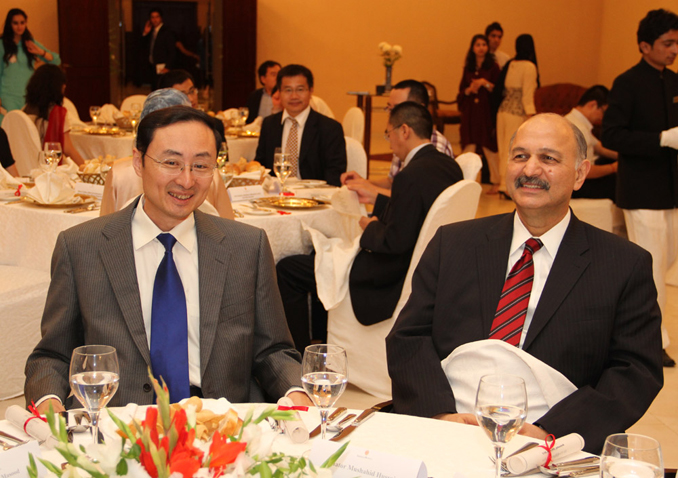 |
| Senator Mushahid with His Excellency Ambassador Sun Weidong of China |
How do you view these reactions?
Pakistan and China today are a source of strength for each other, cooperating on issues at regional and international fora. This is based on the track record of our bilateral relations and on the mutuality of interests. At the regional level, Pakistan and China are keen to promote regional economic cooperation, which includes a relationship driven by economy and energy plus pipelines and communication links, as well as a common quest to see the prevalence of peace, security and stability in south west Asia post US withdrawal. Pakistan is a strategic source of strength for China covering its ‘soft southern underbelly,’ particularly Tibet and Xinjiang. Pakistan is also a window for China on the Muslim world. And it firmly believes that a rising China is a source of strength for all of Asia and it rejects any notion of ‘containment of China,’ since that would mean a reversion to the Cold War.
China also provides Pakistan with strategic support at various international fora, including the United Nations Security Council, the G-20, and institutions like the Nuclear Suppliers Group (NSG). This convergence extends to international issues including the Iranian nuclear standoff, or the Syrian crisis.
How do you feel deepening Pak-China relations have impacted, and continue to impact, both their relations with India and the US, as well as Indo-US bilateral ties?
If there is a common convergence between Pakistan and China about their regional and global world views, a convergence is also discernible between the US and India, with an unstated desire of a section of officialdom in Washington to prop up India as a possible counterweight to rising China. For instance, the Indo-US nuclear deal was not about the nuclear issue, since India gets only 3% of its energy from nuclear sources; rather, it was a strategic step to cobble a new relationship with a strong China-centric component. Then, it is no accident that of late, especially after the announcement in November 2011 by President Obama during his visit to Australia of an Asian Pivot (and in the wake of Secretary of State Hilary Clinton’s article on ‘America’s Pacific Century’). Then, pursuant to this talk, there have been tripartite defence discussions between India, the US and Japan, running concurrently with an invitation from Vietnam to Indian oil companies for oil prospecting in the disputed waters of the South China Sea. There has also been talk form Washington of beefing up US military presence in South East Asia and strengthening defence ties with countries that may be at loggerheads with China on the issue of territorial disputes.
For countries like Pakistan, there is therefore a genuine concern that these steps could be the opening salvos in a new Cold War in Asia: while the US prepares to retreat from Southwest Asia, it plans to return in a big way in Southeast Asia.
Do you feel it is possible to change these perceptions, and how?
Yes, it would be possible to change these perceptions if the approach is less ideological and more realistic, and more in congruence with the emerging realities in Asia, which do not allow for a new kind of Cold War. After 9/11, the US pursued an ideological foreign policy, pushed by the neo cons in Washington that tried to reshape the region according to its interests and objectives. The invasion and occupation of Iraq was a classic example, because that invasion had nothing to do with the tragic events of 9/11 or Al Qaeda or Osama Bin Laden. Simply put, if we look at the emerging economic realities, it’ll be difficult for the US economy to sustain a new confrontation with an ascendant China. As it is, US-China trade now totals almost $540 billion annually, and the same applies to Japan and India, with Japan’s trade with China topping $250 billion per annum, and India’s trade with China totaling almost $75 billion every year. So the hope is that economic realities will take precedence over the priorities pushed by an empowered military industrial complex in the United States.
Both Pakistan and China have major stakes in Afghanistan. In what areas do their interests coincide and how they can cooperate towards achieving them? What direction can Sino-Pak cooperation viz-a-viz Afghanistan be expected to take, post 2014?
I feel that in the coming years, Afghanistan will increasingly become a centerpiece of Pakistan-China convergence of interests in the region. Both are neighbours of Afghanistan and both will be amongst the first to feel the fallout of any conflict there. Continued violence and instability in Afghanistan can spill over into Pakistan’s FATA region and Baluchistan province, while, at the same time, an Afghan civil war could spawn violent extremism in China’s Xinjiang province, which could be de-stabilizing for China’s Northwest region. Therefore, it is not surprising that at the end of September 2012, one of the tip Chinese leaders, Zhou Yongkong, member of the Standing Committee for the Central Committee’s Politburo of the Communist Party of China, visited Afghanistan in the first such high-level visit in 456 years, and signed the first security accord between Kabul and Beijing, whereby China will train Afghanistan’s police for the first time. And China is already the biggest foreign investor in Afghanistan. And Pakistan is already hosting 2.5 million Afghan refugees. So both have a strategic stake in durable peace and stability in Afghanistan. And if a vacuum has to be prevented in the aftermath of the US/NATO exit from Afghanistan, then it is imperative that the six neighbours of Afghanistan, particularly Pakistan and China play a lead role in diplomacy to promote peace in Afghanistan and preserve its territorial integrity and national unity.
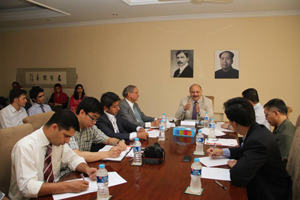 |
| Senator Mushahid giving a briefing at the PCI office on Pakistan-China 2013 Prime Ministerial Visits |
There is a school of thought in Pakistan that advocates a more nuanced Pakistani approach to relations with China, believing it must be conditioned by the view that any support China extends to Pakistan is done with care that it does not affect Sino-US relations, Sino-Indian relations or Chinese core interests, and that, in corollary, should Beijing and Pakistan find their interests to be out of alignment on a particular issue, Beijing will not hesitate to explore other options. What is your view on this?
I feel that this concern is unfounded, because the issues and problems that Pakistan-American relations face, or for that matter Pakistan-India relations, they predate our strategic bonding with China. In fact, it was after the 1962 American embrace of India in the aftermath of the Sino-Indian border conflict, that Pakistan chose to befriend China as an alternative to the United States, and as a counterweight to India in a new sort of balance of power for South Asia. In other words, Pakistan–China relations have become a relationship that stands on its own merits, as a relationship with depth and substance, irrespective of the ebbs and flows in Pakistan’s ties with either the US or India. It is now generally accepted in Pakistan that Islamabad’s intimacy with the US is seasonal, and that Pakistan-India relations remain accident prone, linked to events and developments that can suddenly cause fluctuation in these ties. Conversely, Pakistan-China relations are all weather and therefore more solid and stable, having a resilience of their own, irrespective of the changes in the region around them.
How do you feel the US re-positioning towards the Asia-Pacific region will impact relations between Pakistan and China?
Pakistan has been through this process a couple of times in the past, where geopolitics drew certain lines in Asia and Pakistan was asked to choose between friendship with China and its ties with the then superpowers, but Pakistan took a position that was clear and consistent. At the height of the Cold War, it was the US which tried to put pressure on Pakistan, especially in the context of the 1965 war with India, to stop “flirtation with China,” but Pakistan declined, with President Ayub Khan famously telling President Johnson of the US, in Washington in November 1965, that “If we break with the US, we may lose our economy, but if we break with China, we will weaken the country.” And in 1969, when the Soviet Union, floated the concept of Asian collective security to isolate and counter China in Asia, Pakistan was one of the first and foremost strident opponents of this concept, rejecting it as something detrimental to Pakistan’s vital security interests, giving primacy to our relations with China. So in the current context too, Pakistan’s response will be predictable. Pakistan will stay out of any new schemes that talk of ‘containing China.’
In your view, what challenges will Pakistan-China relations face ahead, following the leadership transition in China and the expected election of Xi Jinping to China’s highest office?
I believe that our policy makers must focus on three particular areas. Firstly, we must work towards eliminating bureaucratic red tape and address allegations of corruption, as these are two issues that can adversely affect Chinese investment in Pakistan and could prove economically harmful. Secondly, we must work towards ensuring greater security for the Chinese expats working here, with particular reference to the experts and technicians who are working on 130 different projects across the country. And thirdly, we must address the Chinese concerns with respect to the roots of violent extremism, which they often believe emanate from Pakistan’s contentious border region with Afghanistan. These are three key challenges that Pak-China relations will face in the time to come.
This interview was first published in Youlin Magazine, Issue #6. January 2013
You may also like: